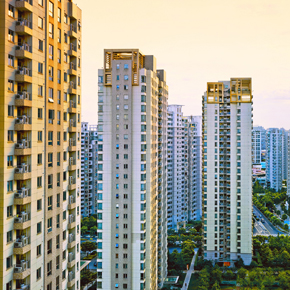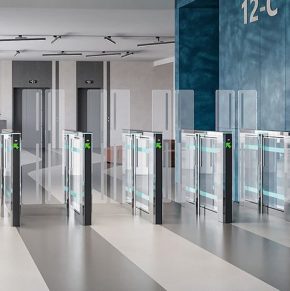
How urban greening will become vital to the future health of our cities
If you haven’t already heard of ‘urban greening’, you soon will. Urban greening is, at its core, the process of making urban environments greener through the introduction of intelligent public and domestic landscaping projects.
The objective of the practice is simply to create as many opportunities as possible for flora to thrive in the city, improving the way that human residents feel about and interact with the immediate environments they pass through and occupy.
A recent report developed and published by leading hard landscape materials company Marshalls, has highlighted just how important urban greening will be to the way our cities and other built-up spaces develop in years to come.
The report, entitled ‘Future Spaces’ is the result of comprehensive research into how, over the next decade the planning, materials and construction of our public spaces might evolve. Calling on academics, architects, engineers, futurologists, and a vast array of other experts, Marshalls has created a valuable and intriguing source of information and insight.
Future Spaces defines four overriding mega-trends that are likely to have the strongest influence in defining the way cities develop. These are: a growing emphasis on sustainability; shifting demographics as populations’ age and female empowerment increases; smart devices that utilise information intelligently to become standard and for urbanisation to accelerate.
In addition to these four pillars of prediction, the report defines 12 specific themes which will become ever more familiar across our future metropolises. Urban greening is one of these themes and can be linked to all four of the global mega-trends. So, looking more closely at urban greening as part of Marshalls’ probing research, how can we expect the phenomena to manifest itself in the cities of the future?
Firstly, we will see designers and architects coming forward to play a far more pivotal role in promoting the benefits of green spaces to their clients. The green spaces they push for will be domestic, civic and commercial alike. The forms that urban greening takes will also be many and diverse; from simple flower gardens to public ‘grow your own’ veg plots and large, elegant green spaces; space will be made for all types of urban greening.
Of course, right now we’re in the midst of a housing crisis. One solution to this is simply to build more, and smaller homes. These more compact residential buildings will have far less disposal space for gardening so those who occupy them will seek ingenious ways to introduce more greenery into their lives. Transportable gardens, container gardens, balconies, roof gardens, and communal outdoor areas will all become commonplace.
Moving away from the domestic into the public sphere and ‘planted architecture’, will be major news. Eye-catching living walls and beautiful ‘vertical forests’ will soon be appearing in every city, from Bristol to Glasgow. These incredible installations will offer botanists and horticulturalists the chance to introduce rare and precious plants to our city streets, boosting biodiversity as they do so.
As the next few years unfold, people will increasingly come to appreciate that living in close proximity to nature is good for our social, emotional and mental wellbeing. Already, studies have demonstrated that demographics who are better off enjoy neighbourhoods which boast a wealth of green space. However, in coming years the connection between green living spaces and better health won’t just be noted, it will be acted upon.
And it’s not just people who benefit directly when urban spaces go green. This research shows that greener city infrastructure would have a quantifiable and positive impact on climate change too. Bolstering the amount of vegetation in a city will help that specific urban area stay cooler, thus reducing the amount of heat it expels into the atmosphere. Additionally, a higher quantity of greenery improves soil infiltration, reducing surface water and the risk of flooding.
Designers of the future will embrace the surge of urban greening, and create products that reflect and further its ethos. Sustainably sourced items and products created by ethically minded manufacturers will arrive on the market, for use by both professional and domestic ‘urban greeners’.
Urban greening then, as one of 12 distinct themes that will come to shape the cities of the future, is an extremely nuanced and wide-reaching idea. Time will tell how warmly and quickly communities and professionals adopt the concept, but, without a doubt, vibrant green spaces should always be at the very heart of any healthy, forward-thinking metropolis.
Latest news

17th April 2025
Nuaire shares expertise at Specifi Mechanical Services events in 2025
Indoor air quality and ventilation manufacturing specialist Nuaire is pleased to be exhibiting at the Specifi Mechanical Services events once again in 2025.
Posted in Air Conditioning, Articles, Building Industry Events, Building Industry News, Building Products & Structures, Building Services, Exhibitions and Conferences, Facility Management & Building Services, Heating, Ventilation and Air Conditioning - HVAC, Restoration & Refurbishment, Retrofit & Renovation
15th April 2025
West Fraser: CaberDek earns top marks from Home Counties carpentry specialist
A specialist carpentry sub-contractor covering housing sites across a large swathe of the Home Counties has come to value CaberDek from the West Fraser range for a variety of reasons: not least because the high quality panel product doesn’t destroy his operatives’ electric saws!
Posted in Articles, Building Industry News, Building Products & Structures, Building Systems, Case Studies, Restoration & Refurbishment, Retrofit & Renovation, Roofs, Timber Buildings and Timber Products, Wooden products
15th April 2025
GEZE: The Role of Access Control Systems in Enhancing Building Safety
Jane Elvins, Specification and Business Development Manager at GEZE UK, delves into the role of access control systems in enhancing building safety…
Posted in Access Control & Door Entry Systems, Architectural Ironmongery, Articles, Building Industry News, Building Products & Structures, Building Services, Doors, Facility Management & Building Services, Health & Safety, Restoration & Refurbishment, Retrofit & Renovation, Security and Fire Protection
11th April 2025
Don’t Do a Dave! It’s Time to Lock FIT Show 2025 in Your Calendar!
It’s that time again – FIT Show is back! You could be forgiven for thinking there won’t be much new to see when FIT Show returns to the NEC from 29 April – 1 May. Wrong!
Posted in Articles, Building Industry Events, Building Industry News, Building Products & Structures, Building Services, Continuing Professional Development (CPD's), Exhibitions and Conferences, Information Technology, Innovations & New Products, Restoration & Refurbishment, Retrofit & Renovation, Seminars, Training
 Sign up:
Sign up: